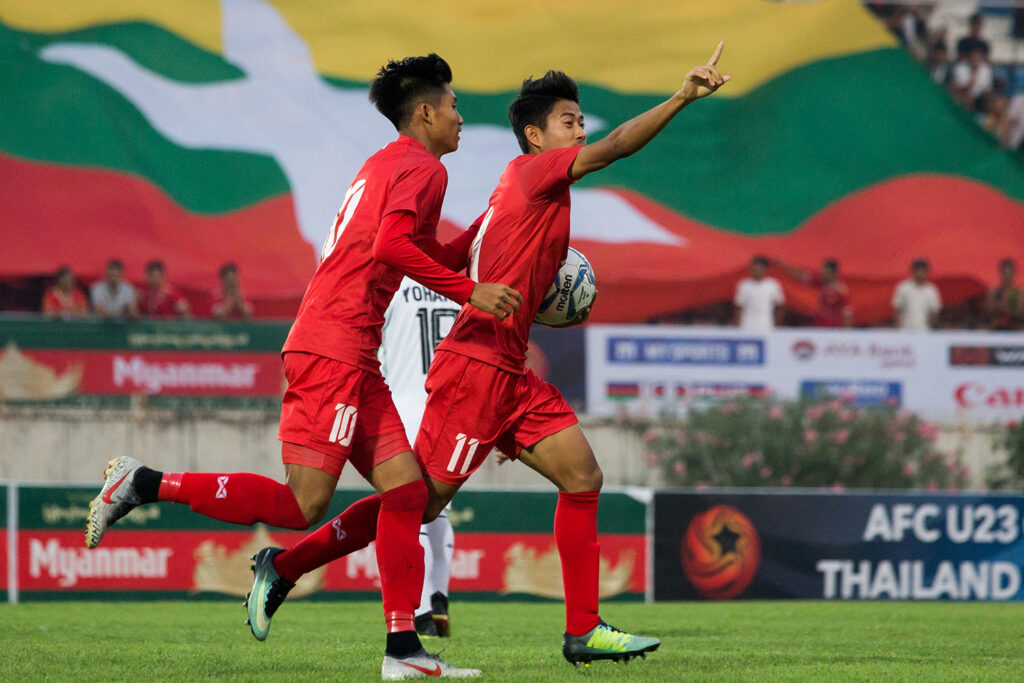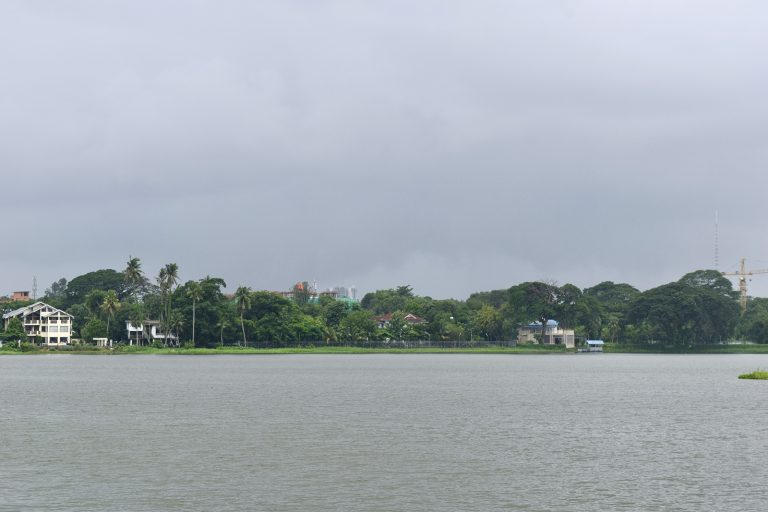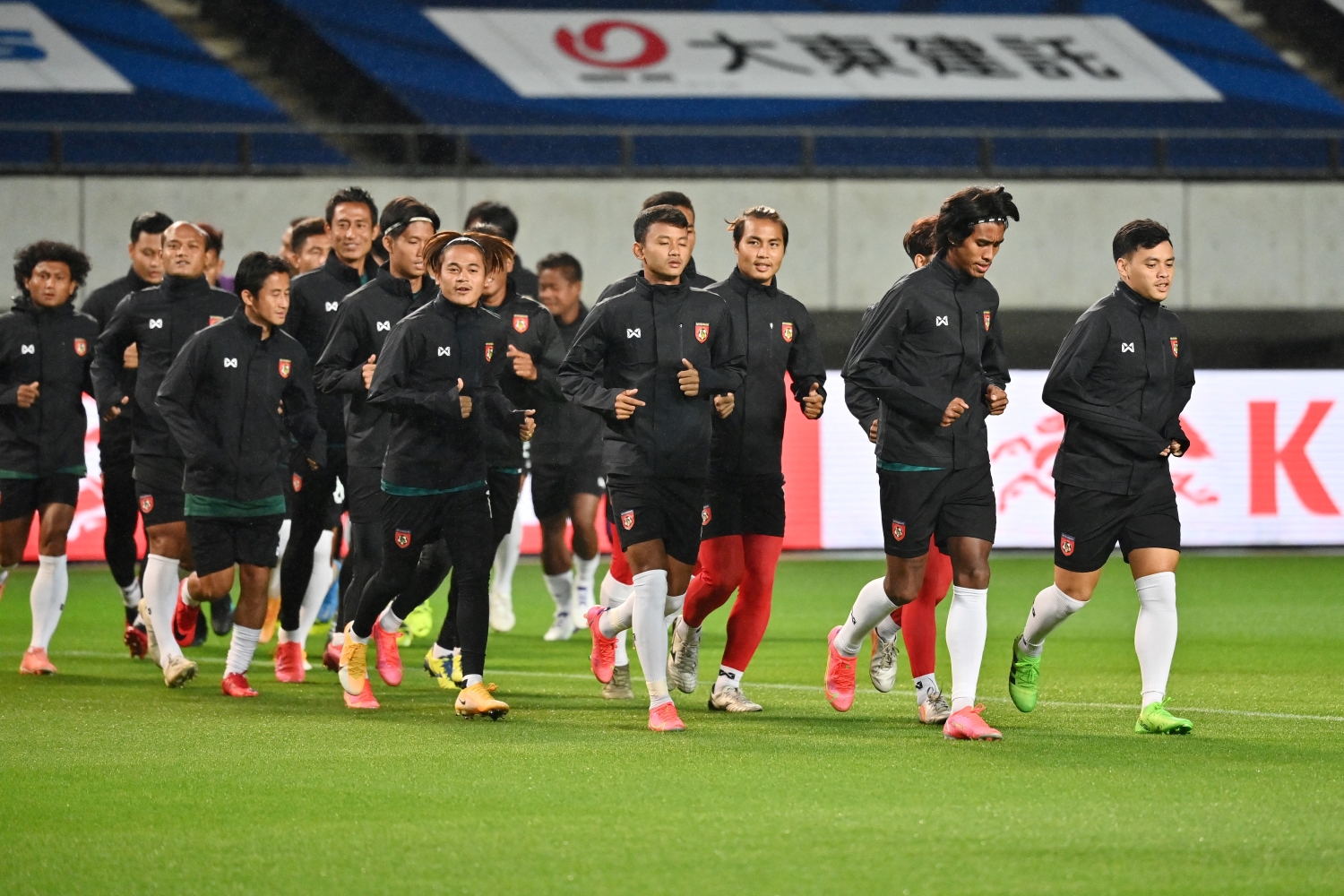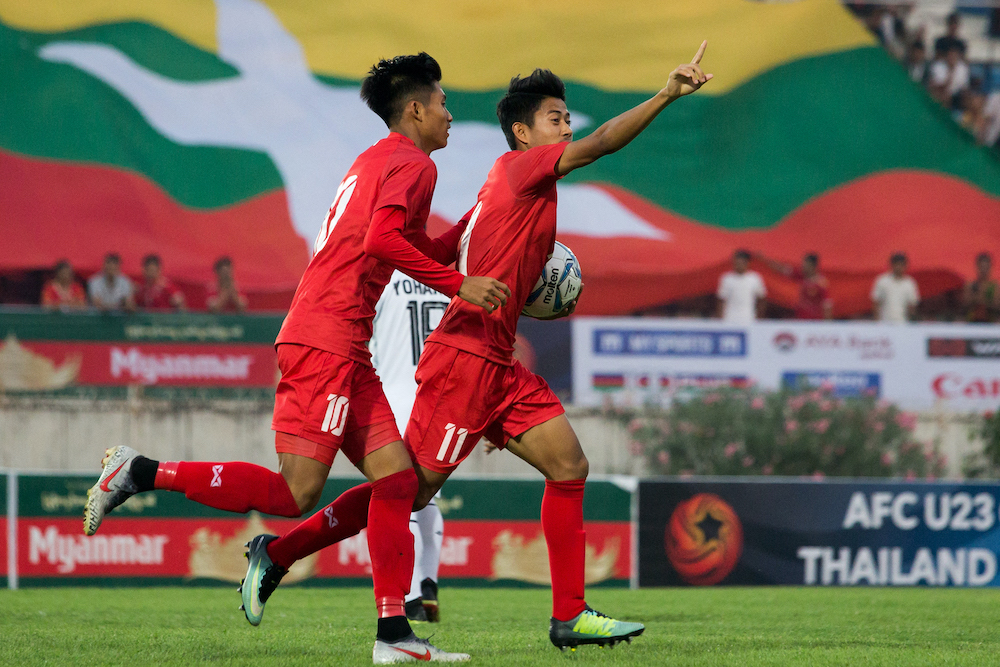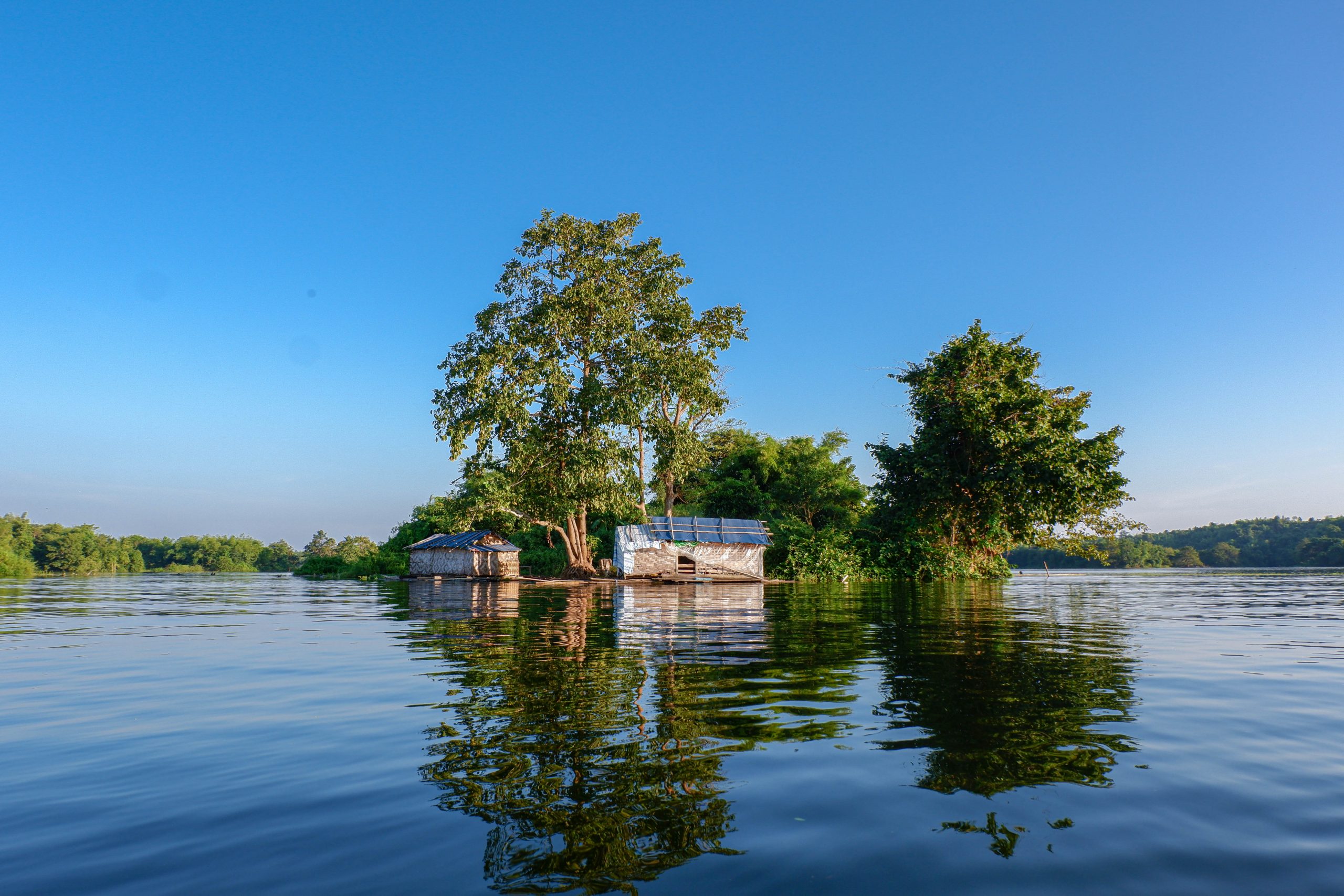Under decades of military rule, Myanmar football declined from its glory days in the 1960s, and the modest progress made during the transition years was spectacularly reversed by the pandemic and the coup.
By FRONTIER
Like many other professional footballers, 25-year-old Ko Kaung Htet Soe from Yangon United had to work a side job during the COVID-19 pandemic, in his case selling petrol at his family’s business. His team, owned by military crony U Tay Za, only paid a portion of his already meagre salary of around K1 million per month, less than US$800 at the exchange rate at the time.
While the Myanmar league suffered during the pandemic, it’s been further decimated by the economic crisis caused by the 2021 coup, when the military seized power from the elected National League for Democracy.
Kaung Htet Soe acknowledged that audience numbers have declined significantly since the coup, but denied that this is because his team is owned by a businessman widely known to be a close associate of the reviled military junta.
“The fans may not have the time to watch football matches or find it time-consuming to travel to the stadiums. Some still watch the matches online through live streaming,” he said. “Playing with fewer spectators does feel a bit disheartening, but that’s the current situation, and we have to accept it.”
Myanmar football has experienced a roller coaster ride of fortunes, often coinciding with political turmoil in the country. The golden age of the 1960s and early 1970s plummeted into decades of ignominy, as the country languished under Ne Win’s brutal military dictatorship.
The national team won gold at the Asian Games in 1966 and 1970, qualifying for the Summer Olympics in 1972. Myanmar was the dominant regional force during that period, winning the biannual Southeast Asian Games a stunning five consecutive times between 1965 and 1973. But as the economy crumbled under Ne Win’s Burmese Way to Socialism, football suffered too. From 1973 until today, Myanmar would go on to win a medal only once more at the Southeast Asian Games, taking silver in 1993.
In 2011, political and economic reforms saw a gradual resurgence, particularly for Myanmar’s youth teams. For the first time in its history, Myanmar qualified for the under-20 World Cup in 2015, and the U-19 team reached the semi-finals of the 2014 Asian Football Federation Cup.
Despite these glimmers of progress, it didn’t translate into much success for the senior national team, which crashed out of the 2018 World Cup qualifiers in the first group stage, suffering a humiliating 9-0 loss to Kuwait.
The turmoil caused by COVID-19 and the military coup has once again rattled an already suffering sport.
U Ye Naing Win, a 40-year-old transfer agent, said domestic club matches were suspended completely for two years during the pandemic, and many clubs were unable to fulfill their financial obligations to their players.
“While some clubs offered minimal support to their players, it fell short considering the players’ obligations towards their families. It was an exceedingly difficult time for everyone involved in football,” he said.
“As a result, some players made the difficult decision to leave their football careers behind and find alternative means of survival during the pandemic. They resorted to various jobs, such as selling clothes on social media or working as taxi drivers.”
The coup compounded these problems by further crashing the economy, while some key players initially refused to represent the Myanmar national team in protest. This resulted in a depleted squad during the World Cup 2022 qualifying campaign, culminating in Myanmar’s worst-ever competitive defeat, losing 10-0 to Japan.
A crony league with no clear target
Yangon United’s owner Tay Za has been sanctioned by Western countries for his alleged role in helping supply the military with the weapons it has turned on thousands of civilians.
But the team is far from an outlier in this regard; many are owned by cronies or politically-connected business tycoons. Ayeyarwady FC is owned by U Zaw Win Shein, founder of Ayeyar Hinthar Holdings, which has been accused of acting as a business proxy for the Tatmadaw.
Shan United, the most successful team in recent history, is owned by Kanbawza Group of Companies, which was under United States sanctions until 2012 for its alleged connections to the military. The Dagon Stars United is owned by the Dagon company, which was similarly sanctioned by the US from 2009-2015.

“Based on my understanding, it appears that these individuals were indeed selected by the successive governments to oversee the management of the clubs,” said Ye Naing Win.
While these tycoons may have initially seen these projects as investments with money-making potential, they more closely resemble failing vanity projects.
“They soon learned that the clubs were not generating profits and instead accumulated more expenses,” Ye Naing Win said.
But because they were saddled with these teams by successive military-backed administrations, they may have little choice but to keep their heads down and continue taking losses in exchange for other prospective business opportunities.
Even the Myanmar Football Federation, tasked with overseeing the domestic league and national team, is dominated by military cronies, including its incumbent president Zaw Zaw, chairman of the Max Myanmar Group of Companies. Tay Za’s son, Pyae Phyo Tay Za, also sanctioned by the US, serves as chairman of the competition committee.
Heading for the exits
Even though the Myanmar National League has resumed, games are only being played in Yangon Region due to instability. In 2020, the last full season before the pandemic and the coup, games were held across the country, including in Sagaing Region and Shan State, both of which have seen significant conflict in recent years.
Ko Si Thu Hein*, an ex-football pundit, said there is insufficient space for all the teams in Yangon, which affects training regiments to the detriment of the overall quality of the league. He said while there has been some support from international football organisations, there has been no support from the revolving door of domestic governments.
“Politics has a significant impact on the football industry in Myanmar, as it influences the relationship between club owners and the government, as well the ability to make a profit,” he said.
Audience interest has also notably declined, likely influenced both by political boycotts and general inconveniences. The military has struggled to provide enough electricity since seizing power, and teams have limited budgets for generators, so games are being held earlier in the day, when many fans are likely to be working.
Fans of teams based outside of Yangon are also unlikely to travel to the commercial capital for games, particularly when so much of the intervening countryside is embroiled in civil war.
Football fan Ko Aung Ko Min said even though he lives in Yangon’s Sanchaung Township, he never watches games anymore and doesn’t even follow the league.
“I have vivid memories of watching Myanmar football matches with my father during my childhood. It used to be a source of fun, excitement, and joy,” he said. “Now I hardly care anymore. I don’t even recognise the players.”
Ko Naing Thu, from Tarmwe Township, agreed.
“I now only follow players who are competing abroad, such as Aung Thu and Than Paing. Matches inside Myanmar no longer hold the same appeal, especially under the rule of the military regime,” he said.
As the league languishes, players are increasingly headed for the exits.
Ye Naing Win, the transfer agent, claimed that last year alone, he helped 14 players from Myanmar to relocate to other countries in the region, including South Korea, Thailand, Laos, and Malaysia. He said even in Thailand’s second division, players earn at least K10 million per month, 10 times the salary they earn in Myanmar’s top division.
He also said salaries in Myanmar were never adjusted when the kyat lost nearly half its value after the coup.
Ko Aung Kaung Mann, a 26-year-old Myanmar national, now plays for Thailand’s Chonburi FC, where he earns K14 million per month, more than 14 times what he earned at Ayeyarwady FC.
“I don’t want to delve into politics at the moment,” he said. “However, player salaries have certainly decreased,” he added, saying he feels “deeply sorry” for his former teammates.
“I do my best to assist them in any way I can.”
Ko Myat Kaung Khant briefly played for the Thai club Trat FC in 2019, but was forced back to Myanmar due to the COVID-19 pandemic. He now earns far less than before, despite being one of the standout players for Shan United, the best team in the league.
“I would return to Thailand to play there again if given another opportunity anytime soon,” he said.
* denotes a pseudonym for safety reasons


